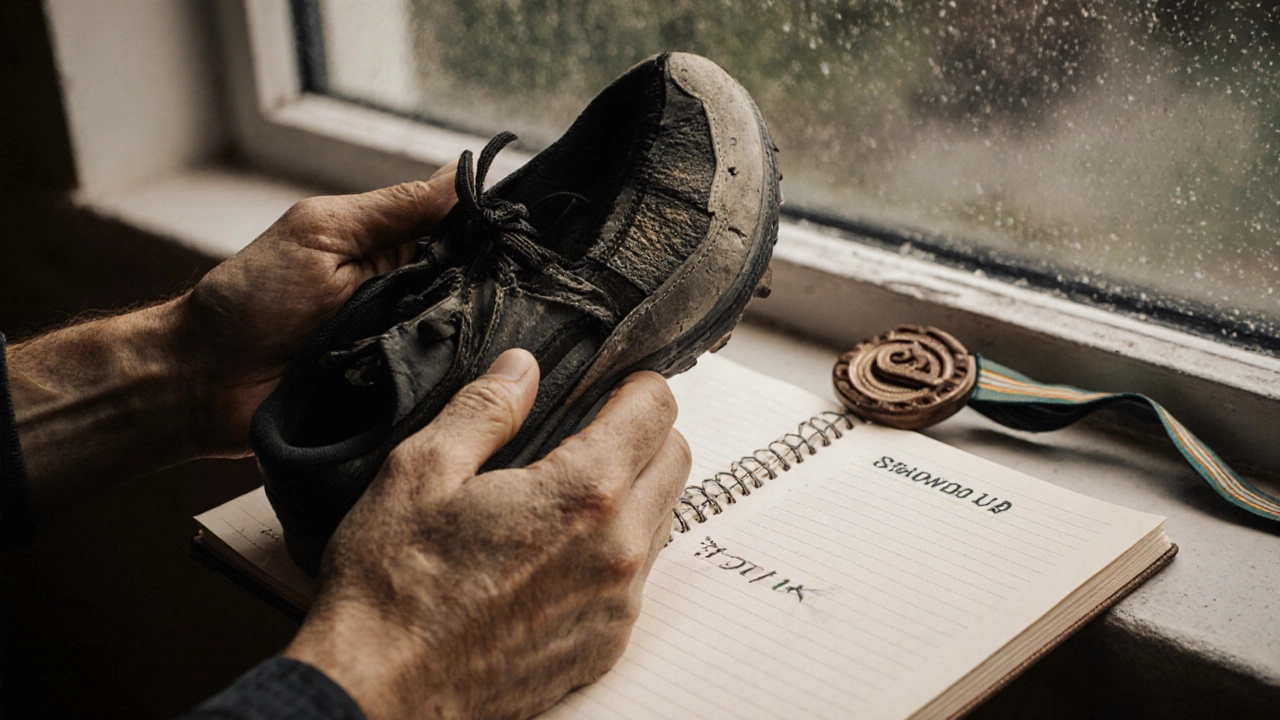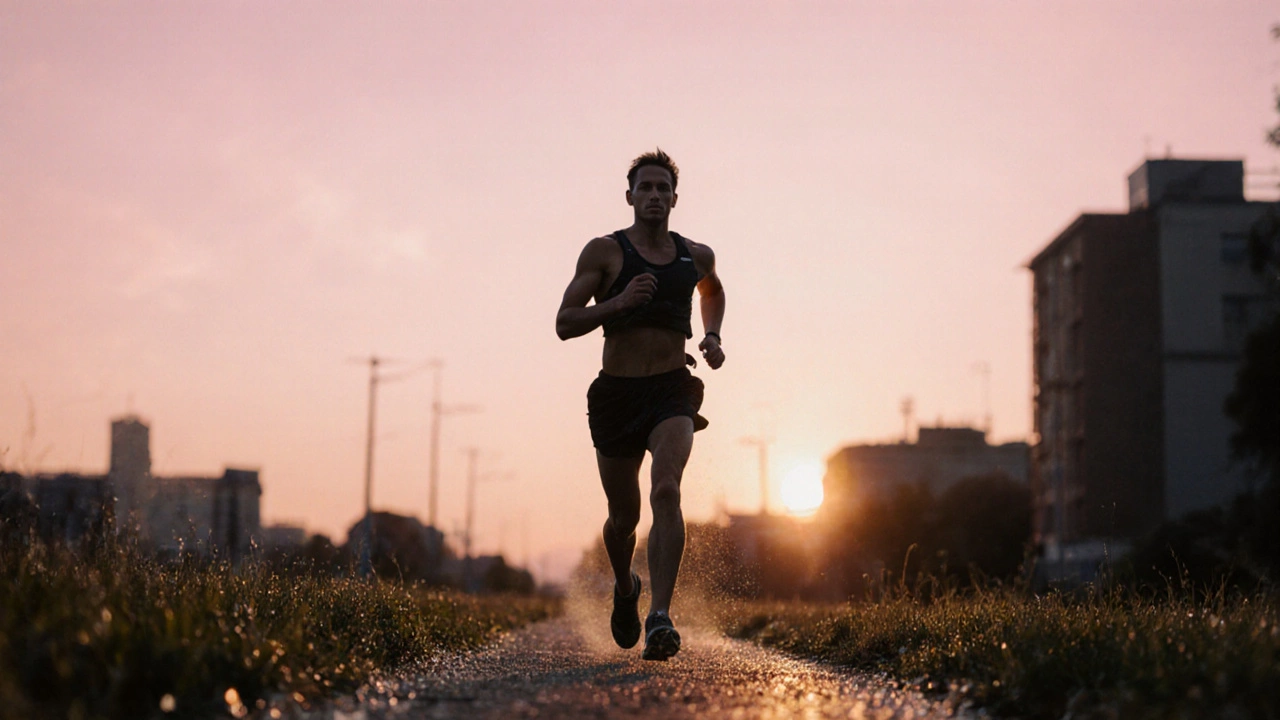Ever watched a marathon finisher cross the line-face streaked with sweat, legs trembling, eyes shining-and wondered if they’re just exhausted… or genuinely happier? It’s not just a gut feeling. Over the last decade, science has started to answer this question in a way that surprises even seasoned runners.
It’s not the finish line-it’s the miles before it
Most people assume marathon runners are happy because they achieved something huge. But the truth? The biggest mood boost doesn’t come from crossing the line. It comes from showing up, day after day, when it’s cold, when you’re tired, when your knees ache. A 2023 study from the University of East Anglia tracked 1,200 amateur runners over 12 months. Those who ran at least three times a week, even without racing, reported a 27% increase in self-reported life satisfaction. The key wasn’t distance-it was consistency.
Running, especially long-distance running, triggers a cascade of neurochemical changes. Endorphins get all the credit, but they’re not the whole story. Endocannabinoids-your body’s natural version of cannabis-are released during prolonged aerobic activity. These bind to the same receptors as THC, reducing anxiety and creating that calm, floating sensation runners call "the runner’s high." But here’s what most don’t realize: you need at least 30 minutes of steady effort to hit it. That’s why 5Ks rarely deliver it, but 10Ks, half-marathons, and marathons do.
Running builds mental resilience you can’t buy
Marathon training isn’t just about building stamina. It’s about rewiring your brain to handle discomfort. Every long run teaches you that pain isn’t permanent. That 30-kilometer mark? It feels like the end of the world. But you keep going. And when you do, your brain learns: I can handle hard things.
This isn’t just motivational fluff. A 2024 meta-analysis in the Journal of Sport and Health Science found that endurance athletes had significantly higher scores on psychological resilience scales than non-runners. The effect was strongest in those who trained without a coach-meaning they learned to self-regulate, adapt, and push through without external validation. That skill doesn’t vanish when the training ends. It transfers to work, relationships, even dealing with illness.
One runner I know in Melbourne, Sarah, started training after her divorce. She didn’t care about finishing times. She cared about showing up. "I didn’t feel better because I ran fast," she told me. "I felt better because I proved to myself I could still show up for me."
Loneliness? You’ll find your tribe
Running is often seen as a solo sport. But marathon training is anything but lonely. Running clubs, group long runs, charity teams-they’re social lifelines. A 2022 study from the University of Oxford found that runners who trained in groups had a 40% higher sense of belonging than those who ran alone. Even if you don’t talk much during runs, the shared rhythm, the silent nods, the post-run coffee rituals-it all builds connection.
These aren’t just casual friendships. They’re bonds forged through vulnerability. You show up exhausted. You admit you’re scared of the next long run. You cry at mile 28. And no one judges. In a world where people hide behind curated social media feeds, running groups offer raw, real connection.

The dark side: when running doesn’t make you happy
But here’s the catch: running doesn’t magically fix depression, trauma, or chronic unhappiness. For some, it becomes another performance metric. Another thing to fail at. A 2021 study from the University of California found that 18% of marathon runners experienced burnout or increased anxiety-usually because they tied their self-worth to their pace, distance, or race results.
That’s the trap. If you’re running to prove something-to lose weight, to impress others, to outrun your past-you’re setting yourself up for disappointment. Happiness doesn’t come from the run. It comes from the relationship you build with yourself during it.
One runner I spoke with, Mark, trained for his first marathon after losing his job. He was determined to finish under 3:30. When he missed his goal by 11 minutes, he spiraled. It took him six months to realize: the problem wasn’t his time. It was his mindset. He started running again-not to race, but to breathe. And that’s when the joy came back.
What actually makes runners happier? The checklist
So, are marathon runners happier? The answer isn’t yes or no. It’s: it depends. Here’s what actually makes the difference:
- Consistency over intensity: Running 3 times a week at a comfortable pace beats one brutal long run followed by two weeks off.
- Process over outcome: Focus on how you feel during and after the run, not your split times or finish position.
- Community over competition: Join a group. Talk to people. Let them see you struggle.
- Self-compassion over perfection: Miss a run? It’s okay. You’re not broken. You’re human.
- Rest as part of training: Sleep, stretching, and days off aren’t failures-they’re what make the joy sustainable.
Marathon training doesn’t guarantee happiness. But it creates the conditions where happiness can grow. It gives you space to think, to feel, to reset. It teaches you that progress isn’t always visible. Sometimes, it’s just showing up.

What if you’ve never run before?
You don’t need to run 42 kilometers to feel this. Start with 20 minutes, three times a week. Walk if you need to. Jog if you can. The goal isn’t to become a marathoner. It’s to become someone who shows up for themselves. After six weeks, most people report feeling calmer, more in control, more like themselves.
There’s no magic in the distance. There’s magic in the habit.
Is marathon running the only way to get this boost?
No. Cycling, swimming, rowing, even brisk walking-any sustained aerobic activity that gets your heart rate up for 30+ minutes can trigger similar effects. But marathons have one unique edge: they force you to commit. You sign up. You train for months. You face fear. That level of commitment, if done with self-compassion, creates a deep sense of agency. You didn’t just run a race. You chose to change.
And that’s where real happiness lives-not in the medal, not in the time, but in the quiet knowing that you showed up for yourself, again and again, even when no one was watching.
Do marathon runners live longer?
Studies show regular runners have a 25-40% lower risk of early death compared to non-runners, according to data from the American Heart Association. But it’s not just marathons-running just 5 to 10 minutes a day at a slow pace reduces mortality risk. Longevity comes from consistency, not speed or distance.
Can running help with anxiety and depression?
Yes. Multiple clinical trials, including one published in JAMA Psychiatry in 2023, found that moderate aerobic exercise like running is as effective as antidepressants for mild to moderate depression, with fewer side effects. Running increases serotonin and norepinephrine, regulates cortisol, and gives you a sense of control-key factors in managing anxiety.
Why do I feel worse after long runs?
It’s normal. Long runs stress your body and brain. If you’re not eating enough, sleeping poorly, or pushing too hard without rest, you’ll feel drained or moody. That’s not failure-it’s feedback. Adjust your fuel, sleep, or mileage. The goal isn’t to suffer. It’s to recover stronger.
Do I need to run a marathon to feel these benefits?
No. The mood benefits start with regular movement. Running 30 minutes, three times a week, for six weeks, is enough to significantly improve your mood and reduce stress. You don’t need 30+ kilometer runs to feel the mental shift.
Is it too late to start if I’m over 40?
Absolutely not. A 2024 study in the British Journal of Sports Medicine tracked adults over 40 who started running for the first time. After 12 months, they reported higher life satisfaction, better sleep, and improved self-esteem-even if they never ran a race. Age doesn’t limit the mental benefits of movement-it just means you need to go slower and recover smarter.
